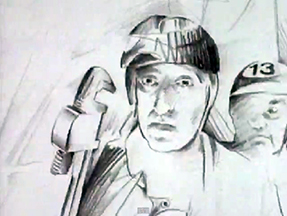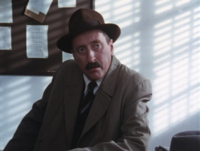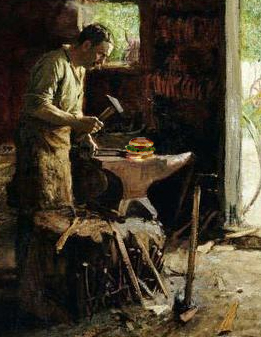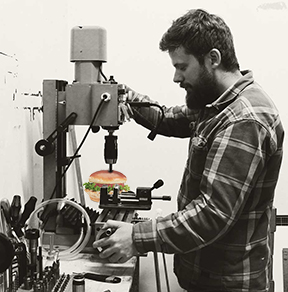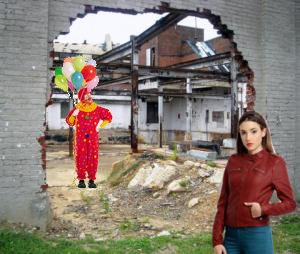“How Can Mirrors Be Real If Our Eyes Aren’t Real?”
— Jaden Smith
Chapter 2: Dog of War, Dog of Love, Cats of Chocolate
They left the restaurant saturated in chocolate, dripping wet with it. Melantha wasn’t quite sure what had happened, but it had been a mess. The manager’s unkind demeanor, if not his spoken words, had left no doubt that they were both permanently banned from the Golden Corral. It reminded Melantha so much of the time that she had been stranded on a desert island with only a shipping crate of machine grease and a hormone-crazed sea captain.
“Oh, Salvador . . . I just realized,” Melantha gasped. She wiped some of the chocolate from her face and flicked it at the ground. It lay there like chocolate, fiercely unmoving and defiant in its inanimateness.
“What?” Salvador stared at the horizon with fierce intensity. The sun had not yet set, and so he grew a full mustache, as all vampires do when exposed to the full light of day. Melantha recoiled in horror. She did not like men with body hair. They reminded her too much of sea captains and lumberjacks, of which she had had her fill.
“For me, being banned from the Golden Corral is not such a big deal. I suppose that I will miss out on the senior citizen discount when I turn sixty-five, but my life is short. You — ”
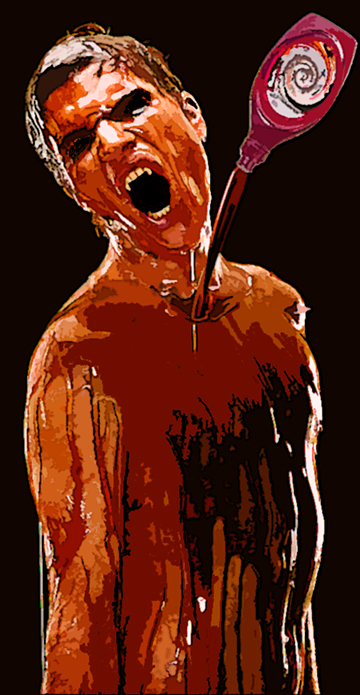 “Yes, first decades shall pass and then centuries, nations will rise and crumble, but still I will not be allowed in the Golden Corral. It is worse than you can imagine though. The manager had specified that he meant every location, not just this one.”
“Yes, first decades shall pass and then centuries, nations will rise and crumble, but still I will not be allowed in the Golden Corral. It is worse than you can imagine though. The manager had specified that he meant every location, not just this one.”
“You could change your identity!”
“A vampire may change his name, but he can never change his identity. The children of these waitresses, and their children’s children, will see me and know that I am banned. Just as a vampire must be invited into a private residence, the rebuke of a manager or assistant manager is enough to bar us entry into a commercial venue. Now, I am stuck frequenting the Cracker Barrel.” Salvador began to lick his chocolate drenched cat clean, grooming it and basking in the energy of its love.
“You still have me,” Melantha reminded him.
“That would be more meaningful if you owned a chocolate fountain, or at least a serviceable fondue pot.”
Little did he know that Melantha had both things stored away at her efficiency apartment. She had been an avid student of the supernatural all her life and knew all of the lore concerning vampires and other mythological creatures. She had anticipated everything about him. “How about we go back to my place? We can clean up and maybe watch Lethal Weapon.”
“Which one?” Salvador asked, suddenly alert. His eyes blazed with intensity as though he had captured the last dying rays of the sun inside of his head and now shot them back at her as figurative light without any of the associated heat or radiance.
“Doesn’t matter. I own them all.”
“You are a very special woman, Melantha Nightshade. This . . . I had not expected –”
Suddenly, they were interrupted when a handsome man stepped suddenly out of the driver’s side door of his landscaping truck. He was shirtless and wearing cutoff jeans that exposed the very bottoms of his firm buttocks. He ran his teak colored fingers through his inky black hair and flashed them a pearlescent smile. Salvador’s cat hissed and arched its back. It was all so very sudden.
“Hello,” the man said, “I am Doctor Esteban Rodriguez, a landscaper by day and world renowned rheumatologist by night. I was just on my way home to change clothes when I saw the two of you and thought to volunteer a hose. However, seeing you up close, I fear that there is more to you than meets the eye.”
“Yes, werewolf, the chocolate masked my vampiric odor, but I am Prince Salvador Poshbennet IV, vampire by day and by night, whose soul occupation is the drinking of blood, eating of chocolate, and petting of cats.” Salvador bared his fangs and made a clawing motion with his free hand that was unmistakably hostile.
“But who is this then?” With a flourish, Doctor Esteban indicated Melantha. He smiled, and it was as though Melantha had known him all of her life . . . or perhaps she had known him in a different life. There was someone very much like him many centuries ago when she had been reincarnated as a parrot, named Ramsey, who had loved and been loved by a kindhearted lemur, named Scott.
Melantha didn’t know what to say, what to think. Here was a real, live werewolf just like the ones that she had read about in physical, digital, and astral books. Werewolves hated vampires because of their affinity for cats, and vampires hated werewolves for their love of garlic and distaste for chocolate. How ironic, Melantha thought, that garlic was harmful for both vampires and cats, while chocolate was poisonous to werewolves and other canines. Perhaps this would be pertinent some time in the future.
“Well, I’ll just be on my way then to change into my scrubs, and hopefully our paths will never cross again, vampire. But young lady, I would like it very much if we could meet again. I treat lupus patients at the Adolphus Clinic, and my Full Moon landscaping business is likewise werewolf-themed, although people don’t get the irony in either instance because my true nature is so secret. Hit me up on the Facebook.”
He did not wait for a reply. With a brief flourish of his middle finger at Salvador, who responded in kind, Doctor Esteban got back in his pickup truck and took off into the early evening. Even though he was gone, the impression that he had left on Melantha would remain all of her life. Her heart beat with such intensity that she questioned the wisdom of her high sugar, high calorie diet. But what choice did she have in food or in love? She was American, where both were saccharine sweet.
“That guy,” Salvador snorted, “Yeeesh. Am I right?”
“Huh?” Melantha’s thoughts were traveling forty-miles-an-hour down Lincoln street in the passenger seat of a werewolf’s pickup truck. Suddenly, Salvador only seemed half as interesting, although he remained fascinating enough that she was emotionally torn between the two men. Melantha could only hope that she didn’t meet Frankenstein’s monster or the Creature from the Black Lagoon, or her dating life would be too difficult to bear.
The sun had not quite set, but close enough — whatever– Salvador’s mustache detached from his face and flew away like the mythical pennangalan, save that it was facial hair and not a human head. It would spend the night tormenting some prepubescent kid. With the mustache gone, Melantha’s immediate choice was simple.
“So . . . about that Lethal Weapon DVD. I’m thinking marathon?”
“You can bet . . . your life!” Salvador laughed. He continued laughing for an uncomfortably long amount of time. “But first you must invite me in . . . to your life.”

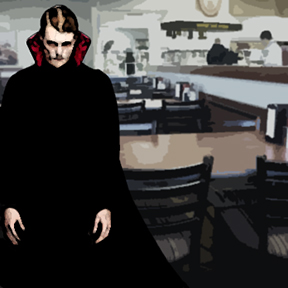 Salvador chuckled. “I will be having the buffet.” He looked lustily toward the chocolate fountain towering above the sneeze guards.
Salvador chuckled. “I will be having the buffet.” He looked lustily toward the chocolate fountain towering above the sneeze guards.
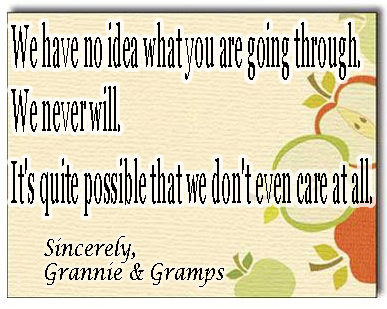




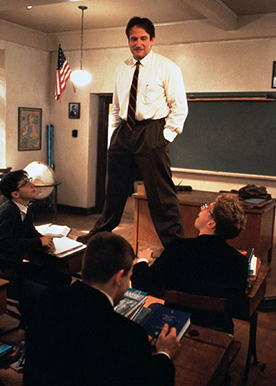

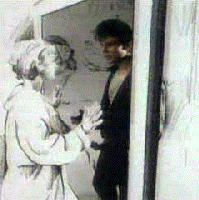 The Magic Pane is the window between the normal and the abnormal. The protagonist lives in our world but is pulled across to a parallel one by an extradimensional force. In the music video, the magic pane is a comic book. The frames come alive, and a hand reaches through to accept the heroine into an alternate world of rotoscope animation. Much like Take on Me, everything in Stranger Things is super ’80s, but Will Byers transitions into the Upside-Down by way of a far more sinister entity. The story becomes a
The Magic Pane is the window between the normal and the abnormal. The protagonist lives in our world but is pulled across to a parallel one by an extradimensional force. In the music video, the magic pane is a comic book. The frames come alive, and a hand reaches through to accept the heroine into an alternate world of rotoscope animation. Much like Take on Me, everything in Stranger Things is super ’80s, but Will Byers transitions into the Upside-Down by way of a far more sinister entity. The story becomes a 